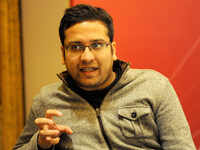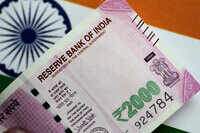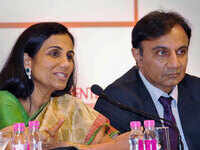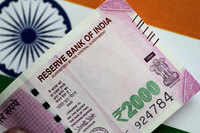Will support companies that start out of India with global impact, says Twitter CEO
Pankaj Doval and Sidhartha | TNN | Updated: Nov 14, 2018, 12:16 ISTHighlights
Twitter CEO and co-founder Jack Dorsey is excited about sharing details of his India trip – from Dalai Lama pulling his nose ring to his trip to Jaipur – but is guarded when you poke him about regulatory issues and dealing with the government. In an interview with TOI, the 41-year-old discusses issues that range from trolling to innovation. Excerpts: Twitter CEO and co-founder Jack Dorseyinteracts with student at IIT Delhi. (TOI photo by Rajesh Mehta)
Twitter CEO and co-founder Jack Dorseyinteracts with student at IIT Delhi. (TOI photo by Rajesh Mehta)You met Rahul Gandhi. What is your impressions of him?
There was a very good conversation -- we talked about Twitter's usage. I shared with him about my vipasana retreat and he does the same. A fairly wide range of topics. He asked good questions about where we're going, and some on the history of the company.
What about PM Narendra Modi, who is a big fan of social media platforms such as Twitter and Facebook?
Yes. It was an opportunity for me to ask a lot of questions. He has used Twitter a lot, he has definitely mastered it as a medium. I asked him about why Twitter, he said he was running a bunch of experiments. He seems very focused on bridging people together. He had a lot of ideas for us around how we can bring folks together, not just in India but across the world.
What are your views about how social media has shaped up since 2006, when you tweeted for the first time and to where we are today? Fake news has emerged as a major challenge.
We do see misinformation on the platform. We believe it's dangerous when it's intending to mislead people. So a lot of our work has been focused on making sure we figure out the product and the patterns that can lead to the amplification of misleading information and do something to reduce that spread. This is not going to be a problem that has a perfect solution. There can be a number of solutions that we'll have to create to do that but we never stop doing that. We will have to focus on tons of experimentation, and some of them will be able to scale to broader audiences. We are going to need to have new solutions and stay 10 steps ahead of everyone else who is trying to game the system and spread misinformation beyond their reach.
What about issues like labelling of bots? Do you think that anonymous sign-ins are a problem?
We have this concept of a pseudonym, which is a built identity. This is important for whistle blowers, parody accounts, activists, journalists who might have some threat against their career if they say something. It has a lot of value. What we can do is, we can be better at labelling – what might be a bot automation or what might be a parody account. Again, providing context for people so that they can make their own decisions about what they are seeing and how credible the information is.
Fake news has taken a very serious proportion in India and we saw incidents of mob lynching because of that. How concerned are you with that?
Very concerned. We are going to make this problem as small as possible so that we can address it. Where it gets dangerous is when information misleads people and they actually take action based on what they read or what they see. That is what we are focused on.
On Monday, the government said that sometimes there a gap in addressing their requests. Does the government sometimes gets too intrusive? Is it time for you to react faster?
It on the case, the government is doing its job and we're doing our job. There're always opportunities to move faster. We need to recognize where they may be gaps in reaction times, and why those gaps exist.
There seems to be a move at tighter regulations and TRAI issued a consultation paper where it is looking at getting companies to register in India. In a connected world, do you need these things?
Our job is to help educate regulators about what's possible, what we see. Anything interesting from secular trends. Ideally the regulators' job is to level the playing field. Protect the individual. As long as we are informing regulators in the right way then potentially there will be great outcomes but it's a case by case basis.
There are lot of issues like cross-border violation of data, taking out the data from India and some of the data has been classified as sensitive and they say you cannot take that out from India. Your views?
That's counter to what the internet provides. This is firming up the different stream of where the internet is going.
Government thinks the data should be stored in India. Is it technically possible to do that or do you think that's very difficult to do?
Anything is possible but it puts constraints on possibilities and opportunities. I believe people should have access to their data but I don't think it matters where it is stored. That would be against where the internet is going.
Are there any particular concerns or challenges where more needs to be done in India?
More regulation here or anywhere, and things like data localisation make things more challenging. But it's hard to comment on anything specifically.
You've increased the number of characters in a tweet. What is the response?
The reason we did it is was because people were cramming their thoughts into 140 characters and that was not resulting in more Tweets. It was resulting in them abandoning Twitter in the first place. It doesn't take away from the amazing constraint that it provides in helping you be clear, crisp and poetic. But not everyone wants to be a poet and not everyone wants to be precise. Sometimes people just want to express themselves. And when they face 140 characters and felt they couldn't express themselves, they went away. We went to Japan for inspiration. 140 characters in Japanese is a lot. You can say something really meaningful but you still have the sense of brevity. So we doubled the character count. We thought 280 was the right balance so we tested it with a small population on Twitter. What we found was that for original tweets, the average tweet length did not go up. What did go up was when people replied, so when people replied to a tweet they tend to break the 140 characters to allow for more nuance in conversation, civil discourse. Which resulted in more conversations which meant it worked.
Have you noticed any special characteristic with Indians? We generally tend to be more talkative.
Yes. It is a very conversational culture and society. That's exactly what we want. It also lends itself to more transparency. We also want to see more of this. India and japan represent some future of the product.
How are comments on Twitter taken by people who matter, especially politicians? Are people getting more sensitive or intolerant?
The nature of the service might make it easier to get upset faster. That's on us to help fix words, to help in having more meaningful conversations. The amount of intolerance has certainly increased, globally.
Is it good if intolerance levels are going down?
I don't think it's good, and nor is it about patience. I think it's more about empathy and seeing each other, and feeling more connection. The best way to build empathy is through conversation and that's what we do. We serve conversation. So, I do think that the amount of intolerance has gone up, and I do think that you should help decrease it through conversations
India offers to you a huge user base. Are the business opportunities proportionately large in India? How do you plan to expand here?
One of the reasons that it was important for me to come here was that we see a lot of opportunities here both in terms of usage, and also in terms of business. So we wanted to invest towards that.
How do you view the innovation eco-system here and the growth of start-ups? Do you see opportunities in terms of aligning them with your business and in terms of investments?
We had a chance to visit some innovation hubs at IIT and got to see some early stage technology and products. There will be a lot of amazing companies with global impact that start out of India. I will go ahead and support them in whatever way I can. I don't think Silicon Valley can be or should be the answer to every single start-up to be born. It's had its time.
Why is it that India has not been able to give birth to a global internet company?
Technologies will enable more of that (innovation). A lot of companies don't want to headquarter in Silicon Valley or San Francisco anymore. They want to be completely distributed. So, that's the future. In future, the idea may originate where it might have the greatest impact but our workforces are going to be increasingly global.
There are often comparisons between Facebook and Twitter…
Those are bad comparisons. We are very different. You don't benefit from Twitter by the address book that you have. You don't benefit from your former co-workers or friends or family. You benefit because you are interested in something in the world and you can express that interest and you can find really interesting people around that interest.
Apart from Twitter, do you use other social networking platforms? Are you on Facebook?
No. I don't need it.
When we look at the fast growing start-up culture, a big worry is that people start looking at valuations from Day 1.
Anyone who has such a mindset, we will probably not be talking about those companies anymore. So they are probably not very relevant. Or probably they've been bought by companies that are more relevant. You built something because you are solving someone's problem. Ideally, that resonates with an amazing mass of people.
A lot of people who set up successful start-ups are not able to manage the things as successfully later on. Where does the innovator stop, and when does the manager take charge? Can an innovator also be a successful manager or a CEO?
I think it depends by what you mean by a manager or CEO. I have never thought about myself as being a CEO. It's not just not that useful for me. I am here to ensure that we are building something that is viable for people, and that we have people who are aligned with that purpose. I don't care about the title, or the role. So, if I am relevant to the organisation, relevant to the service, then I should be doing what I am doing. If not, I should be doing something else.
How difficult it is to be like Steve Jobs and keep on innovating?
Ask jobs! You have to continuously ask the question why. And getting deeper and deeper. Constantly experimenting. But it gets harder as you grow bigger. When was the last time when you were on a skateboard? You are scared of getting hurt now as you've lost the joy of it. As long as you can maintain that sense of risk, getting on the skateboard again and experimenting and how joyful it feels when you are doing it. So, as long as you maintain that mindset, it's good.
There was a very good conversation -- we talked about Twitter's usage. I shared with him about my vipasana retreat and he does the same. A fairly wide range of topics. He asked good questions about where we're going, and some on the history of the company.
What about PM Narendra Modi, who is a big fan of social media platforms such as Twitter and Facebook?
Yes. It was an opportunity for me to ask a lot of questions. He has used Twitter a lot, he has definitely mastered it as a medium. I asked him about why Twitter, he said he was running a bunch of experiments. He seems very focused on bridging people together. He had a lot of ideas for us around how we can bring folks together, not just in India but across the world.
What are your views about how social media has shaped up since 2006, when you tweeted for the first time and to where we are today? Fake news has emerged as a major challenge.
We do see misinformation on the platform. We believe it's dangerous when it's intending to mislead people. So a lot of our work has been focused on making sure we figure out the product and the patterns that can lead to the amplification of misleading information and do something to reduce that spread. This is not going to be a problem that has a perfect solution. There can be a number of solutions that we'll have to create to do that but we never stop doing that. We will have to focus on tons of experimentation, and some of them will be able to scale to broader audiences. We are going to need to have new solutions and stay 10 steps ahead of everyone else who is trying to game the system and spread misinformation beyond their reach.
What about issues like labelling of bots? Do you think that anonymous sign-ins are a problem?
We have this concept of a pseudonym, which is a built identity. This is important for whistle blowers, parody accounts, activists, journalists who might have some threat against their career if they say something. It has a lot of value. What we can do is, we can be better at labelling – what might be a bot automation or what might be a parody account. Again, providing context for people so that they can make their own decisions about what they are seeing and how credible the information is.
Fake news has taken a very serious proportion in India and we saw incidents of mob lynching because of that. How concerned are you with that?
Very concerned. We are going to make this problem as small as possible so that we can address it. Where it gets dangerous is when information misleads people and they actually take action based on what they read or what they see. That is what we are focused on.
On Monday, the government said that sometimes there a gap in addressing their requests. Does the government sometimes gets too intrusive? Is it time for you to react faster?
It on the case, the government is doing its job and we're doing our job. There're always opportunities to move faster. We need to recognize where they may be gaps in reaction times, and why those gaps exist.
There seems to be a move at tighter regulations and TRAI issued a consultation paper where it is looking at getting companies to register in India. In a connected world, do you need these things?
Our job is to help educate regulators about what's possible, what we see. Anything interesting from secular trends. Ideally the regulators' job is to level the playing field. Protect the individual. As long as we are informing regulators in the right way then potentially there will be great outcomes but it's a case by case basis.
There are lot of issues like cross-border violation of data, taking out the data from India and some of the data has been classified as sensitive and they say you cannot take that out from India. Your views?
That's counter to what the internet provides. This is firming up the different stream of where the internet is going.
Government thinks the data should be stored in India. Is it technically possible to do that or do you think that's very difficult to do?
Anything is possible but it puts constraints on possibilities and opportunities. I believe people should have access to their data but I don't think it matters where it is stored. That would be against where the internet is going.
Are there any particular concerns or challenges where more needs to be done in India?
More regulation here or anywhere, and things like data localisation make things more challenging. But it's hard to comment on anything specifically.
You've increased the number of characters in a tweet. What is the response?
The reason we did it is was because people were cramming their thoughts into 140 characters and that was not resulting in more Tweets. It was resulting in them abandoning Twitter in the first place. It doesn't take away from the amazing constraint that it provides in helping you be clear, crisp and poetic. But not everyone wants to be a poet and not everyone wants to be precise. Sometimes people just want to express themselves. And when they face 140 characters and felt they couldn't express themselves, they went away. We went to Japan for inspiration. 140 characters in Japanese is a lot. You can say something really meaningful but you still have the sense of brevity. So we doubled the character count. We thought 280 was the right balance so we tested it with a small population on Twitter. What we found was that for original tweets, the average tweet length did not go up. What did go up was when people replied, so when people replied to a tweet they tend to break the 140 characters to allow for more nuance in conversation, civil discourse. Which resulted in more conversations which meant it worked.
Have you noticed any special characteristic with Indians? We generally tend to be more talkative.
Yes. It is a very conversational culture and society. That's exactly what we want. It also lends itself to more transparency. We also want to see more of this. India and japan represent some future of the product.
How are comments on Twitter taken by people who matter, especially politicians? Are people getting more sensitive or intolerant?
The nature of the service might make it easier to get upset faster. That's on us to help fix words, to help in having more meaningful conversations. The amount of intolerance has certainly increased, globally.
Is it good if intolerance levels are going down?
I don't think it's good, and nor is it about patience. I think it's more about empathy and seeing each other, and feeling more connection. The best way to build empathy is through conversation and that's what we do. We serve conversation. So, I do think that the amount of intolerance has gone up, and I do think that you should help decrease it through conversations
India offers to you a huge user base. Are the business opportunities proportionately large in India? How do you plan to expand here?
One of the reasons that it was important for me to come here was that we see a lot of opportunities here both in terms of usage, and also in terms of business. So we wanted to invest towards that.
How do you view the innovation eco-system here and the growth of start-ups? Do you see opportunities in terms of aligning them with your business and in terms of investments?
We had a chance to visit some innovation hubs at IIT and got to see some early stage technology and products. There will be a lot of amazing companies with global impact that start out of India. I will go ahead and support them in whatever way I can. I don't think Silicon Valley can be or should be the answer to every single start-up to be born. It's had its time.
Why is it that India has not been able to give birth to a global internet company?
Technologies will enable more of that (innovation). A lot of companies don't want to headquarter in Silicon Valley or San Francisco anymore. They want to be completely distributed. So, that's the future. In future, the idea may originate where it might have the greatest impact but our workforces are going to be increasingly global.
There are often comparisons between Facebook and Twitter…
Those are bad comparisons. We are very different. You don't benefit from Twitter by the address book that you have. You don't benefit from your former co-workers or friends or family. You benefit because you are interested in something in the world and you can express that interest and you can find really interesting people around that interest.
Apart from Twitter, do you use other social networking platforms? Are you on Facebook?
No. I don't need it.
When we look at the fast growing start-up culture, a big worry is that people start looking at valuations from Day 1.
Anyone who has such a mindset, we will probably not be talking about those companies anymore. So they are probably not very relevant. Or probably they've been bought by companies that are more relevant. You built something because you are solving someone's problem. Ideally, that resonates with an amazing mass of people.
A lot of people who set up successful start-ups are not able to manage the things as successfully later on. Where does the innovator stop, and when does the manager take charge? Can an innovator also be a successful manager or a CEO?
I think it depends by what you mean by a manager or CEO. I have never thought about myself as being a CEO. It's not just not that useful for me. I am here to ensure that we are building something that is viable for people, and that we have people who are aligned with that purpose. I don't care about the title, or the role. So, if I am relevant to the organisation, relevant to the service, then I should be doing what I am doing. If not, I should be doing something else.
How difficult it is to be like Steve Jobs and keep on innovating?
Ask jobs! You have to continuously ask the question why. And getting deeper and deeper. Constantly experimenting. But it gets harder as you grow bigger. When was the last time when you were on a skateboard? You are scared of getting hurt now as you've lost the joy of it. As long as you can maintain that sense of risk, getting on the skateboard again and experimenting and how joyful it feels when you are doing it. So, as long as you maintain that mindset, it's good.
Download The Times of India News App for Latest Business News.










































All Comments ()+^ Back to Top
Refrain from posting comments that are obscene, defamatory or inflammatory, and do not indulge in personal attacks, name calling or inciting hatred against any community. Help us delete comments that do not follow these guidelines by marking them offensive. Let's work together to keep the conversation civil.
HIDE